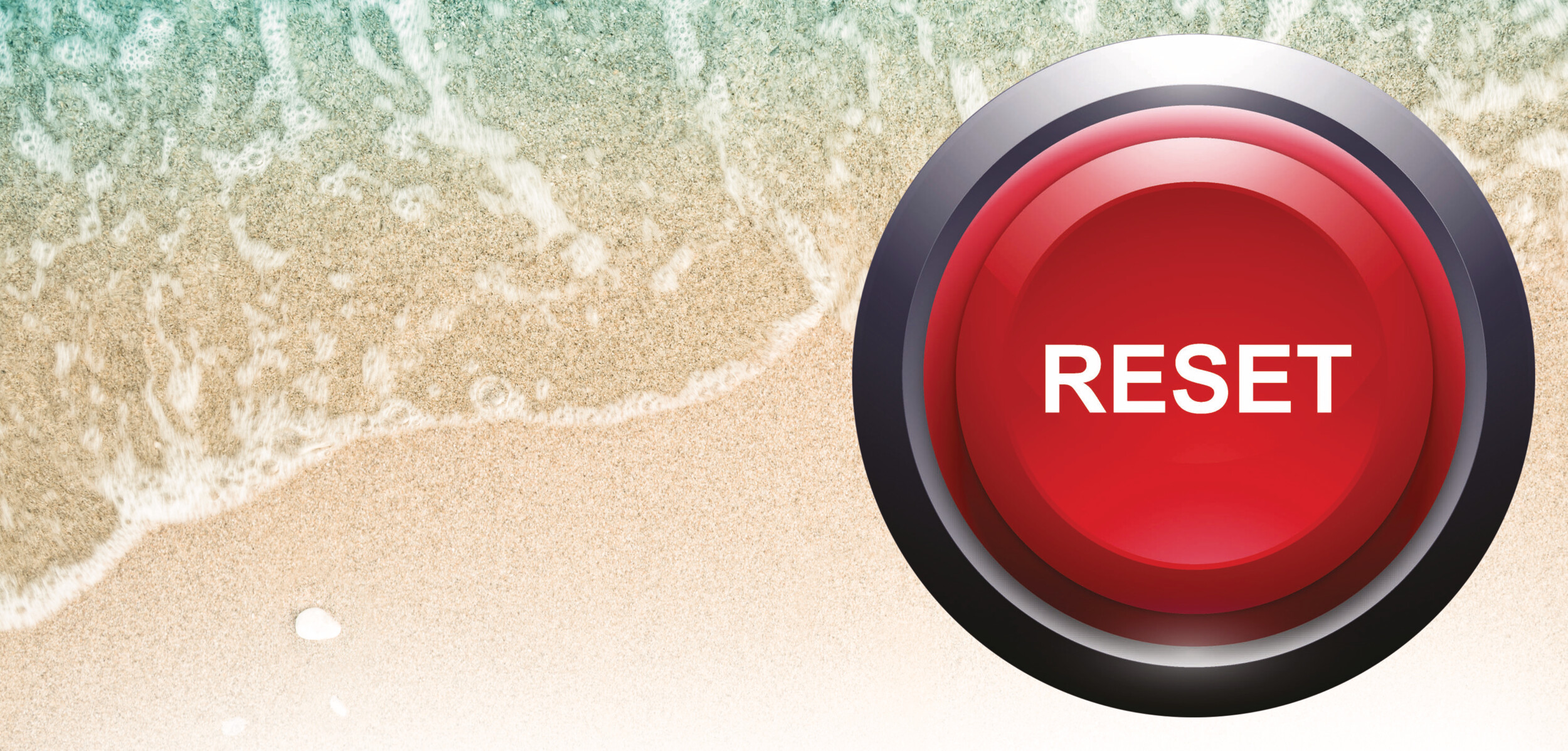*/

And what benefits do you want to see? Nikki Alderson shares seven strategies to start the ball rolling…
Are you ready to hit that summer re-set button? Or are your work habits, and their damaging knock-on effects, still lingering? While friends and colleagues are taking advantage of the opportunity to go away on holiday, perhaps you are wondering why your work responsibilities and expectations feel the same.
Some people may relish the promise of lazy, sunny days, whether at home or abroad. But if you thrive on routine, the thought of a lack of structure might also be leaving you cold.
Thinking back to my days at the Criminal Bar, trying to get anything done through August was something of a running joke. So many were away on holiday or spending time with their children and the courts were working at reduced capacity. Productivity took a predictable downturn as the profession seemingly ground to a halt, and the barrage of Out of Office email notifications began.
Could August be an opportunity for a change in perspective? To take some time off to relax and recharge? Arguably there’s no better time to do so, when the profession, as a whole, is adjusting to the traditional summer slow-down.
Imagine if pressing the summer ‘reset’ button held the secret to the longer-term maintenance and enjoyment of a healthy and fulfilling work and home life. How could you best capitalise on the shift in gear, to reduce workload and stress levels? Here are seven strategies to start the ball rolling:
1. Use the time for a genuine break. Instead of replacing time at work for time doing jobs around the house and garden, ensure you take time to rest and relax. A swing in a hammock with a good book might be just the ticket to unwind, problem-solve, learn or inspire.
2. In the same vein, recharge. Get away. And I mean ‘away, away’, as my clerks would say. Give yourself permission to take a complete break away from work. The positive benefits to mental health of a change of environment, particularly by the sea, are well-documented.
3. Make it easy on yourself to do this. While away, switch off. Avoid digital distraction. Unplug. It may seem obvious, but a useful starting point is separate work and personal mobiles to avoid the mistakes I’ve made. Holidays to Thailand and Prague ruined by picking up the phone to be told of some urgent matter that apparently needed my immediate attention, even in places without internet access, and where the alleged problem clearly would in fact have waited until my return without the legal world imploding. Go a step further and consider a digital detox. Time without devices forces a level of interaction, presence and connection to which many aspire but struggle to achieve at home, living in this 24/7 digitally accessible world. Use the automatic Out of Office response to communicate healthy boundaries and manage client expectations whilst unavailable. Turn off email notifications and only check at set times during the day, if at all. Activate airplane mode for a fully immersive level of disconnection. Remove social media apps from mobile devices and set strict times for intentional, deliberate access.
4. Even if, ordinarily, you are a creature of habit and find the lack of routine over summer disconcerting, appreciate the change in pace as a chance, beyond screens, to re-connect with others, and your fun side. Create your own structure, if it helps, outside of work: socialise informally with colleagues in healthy outdoor pursuits like ‘netwalking’, or picnics and barbeques with the kids.
5. Capitalise on the longer, lighter, sunnier days to re-emerge and increase levels of vitamin D and serotonin to enhance mood and encourage healthier habits around being outside, even if you do continue to work at the outside table! Summer gifts us a rare opportunity to be outdoors and get in touch with nature. Make good use of it, eg: 20-30 mins of outdoor cardio-vascular exercise – whether that’s a power walk, cycle ride or game of tennis with friends, or solo swimming, yoga or meditation; all are credited with improving mood and promoting a sense of wellbeing. Try a new hobby outside, like gardening, over and above exercise, taking advantage of the change in pace. Have a crack at practising mindfulness and daily gratitudes, becoming fully present in the moment, paying attention to and being grateful for the natural world around you, and your thoughts and feelings within it.
6. Reflect and allow your mind to wander, sitting under your parasol on the sun lounger. Away from the desk and your usual environment, you can gain a degree of perspective which is otherwise missing in ordinary, everyday life. This can be the best time to do the honest, strategic or creative thinking, and answer the bigger questions of the day around purpose and goals to inspire forward momentum. Or it may be that you gain clarity on a tricky point in a case that you hadn’t previously been able to see. Harness this freedom of thought and use the change in perspective to your advantage. Check in with yourself:
Think of your wins and losses, your successes and learnings. Re-evaluate habits that serve you and eradicate those that don’t.
If it’s time to think about career progression, consider next steps. What is the timeline to prepare for a possible silk interview? If you are considering re-positioning yourself, what research do you need to do about other areas of law, chambers or the Employed Bar? Who could you ask for help or support? How will you enhance your current experience or qualifications?
7. On those latter points, where you identify developmental gaps, see the opportunity, as opposed to the obstacles, to upskill. With time away from work, no better time to learn something new. It could be work or pleasure, Spanish, for example, if a trip to the Balearics is on the cards. Learning new skills can be as rewarding as confidence-building, and can help get ahead of the curve for the new autumn term.
Check in with yourself this time next year and see how far you’ve come. Your future self will thank you.

Are you ready to hit that summer re-set button? Or are your work habits, and their damaging knock-on effects, still lingering? While friends and colleagues are taking advantage of the opportunity to go away on holiday, perhaps you are wondering why your work responsibilities and expectations feel the same.
Some people may relish the promise of lazy, sunny days, whether at home or abroad. But if you thrive on routine, the thought of a lack of structure might also be leaving you cold.
Thinking back to my days at the Criminal Bar, trying to get anything done through August was something of a running joke. So many were away on holiday or spending time with their children and the courts were working at reduced capacity. Productivity took a predictable downturn as the profession seemingly ground to a halt, and the barrage of Out of Office email notifications began.
Could August be an opportunity for a change in perspective? To take some time off to relax and recharge? Arguably there’s no better time to do so, when the profession, as a whole, is adjusting to the traditional summer slow-down.
Imagine if pressing the summer ‘reset’ button held the secret to the longer-term maintenance and enjoyment of a healthy and fulfilling work and home life. How could you best capitalise on the shift in gear, to reduce workload and stress levels? Here are seven strategies to start the ball rolling:
1. Use the time for a genuine break. Instead of replacing time at work for time doing jobs around the house and garden, ensure you take time to rest and relax. A swing in a hammock with a good book might be just the ticket to unwind, problem-solve, learn or inspire.
2. In the same vein, recharge. Get away. And I mean ‘away, away’, as my clerks would say. Give yourself permission to take a complete break away from work. The positive benefits to mental health of a change of environment, particularly by the sea, are well-documented.
3. Make it easy on yourself to do this. While away, switch off. Avoid digital distraction. Unplug. It may seem obvious, but a useful starting point is separate work and personal mobiles to avoid the mistakes I’ve made. Holidays to Thailand and Prague ruined by picking up the phone to be told of some urgent matter that apparently needed my immediate attention, even in places without internet access, and where the alleged problem clearly would in fact have waited until my return without the legal world imploding. Go a step further and consider a digital detox. Time without devices forces a level of interaction, presence and connection to which many aspire but struggle to achieve at home, living in this 24/7 digitally accessible world. Use the automatic Out of Office response to communicate healthy boundaries and manage client expectations whilst unavailable. Turn off email notifications and only check at set times during the day, if at all. Activate airplane mode for a fully immersive level of disconnection. Remove social media apps from mobile devices and set strict times for intentional, deliberate access.
4. Even if, ordinarily, you are a creature of habit and find the lack of routine over summer disconcerting, appreciate the change in pace as a chance, beyond screens, to re-connect with others, and your fun side. Create your own structure, if it helps, outside of work: socialise informally with colleagues in healthy outdoor pursuits like ‘netwalking’, or picnics and barbeques with the kids.
5. Capitalise on the longer, lighter, sunnier days to re-emerge and increase levels of vitamin D and serotonin to enhance mood and encourage healthier habits around being outside, even if you do continue to work at the outside table! Summer gifts us a rare opportunity to be outdoors and get in touch with nature. Make good use of it, eg: 20-30 mins of outdoor cardio-vascular exercise – whether that’s a power walk, cycle ride or game of tennis with friends, or solo swimming, yoga or meditation; all are credited with improving mood and promoting a sense of wellbeing. Try a new hobby outside, like gardening, over and above exercise, taking advantage of the change in pace. Have a crack at practising mindfulness and daily gratitudes, becoming fully present in the moment, paying attention to and being grateful for the natural world around you, and your thoughts and feelings within it.
6. Reflect and allow your mind to wander, sitting under your parasol on the sun lounger. Away from the desk and your usual environment, you can gain a degree of perspective which is otherwise missing in ordinary, everyday life. This can be the best time to do the honest, strategic or creative thinking, and answer the bigger questions of the day around purpose and goals to inspire forward momentum. Or it may be that you gain clarity on a tricky point in a case that you hadn’t previously been able to see. Harness this freedom of thought and use the change in perspective to your advantage. Check in with yourself:
Think of your wins and losses, your successes and learnings. Re-evaluate habits that serve you and eradicate those that don’t.
If it’s time to think about career progression, consider next steps. What is the timeline to prepare for a possible silk interview? If you are considering re-positioning yourself, what research do you need to do about other areas of law, chambers or the Employed Bar? Who could you ask for help or support? How will you enhance your current experience or qualifications?
7. On those latter points, where you identify developmental gaps, see the opportunity, as opposed to the obstacles, to upskill. With time away from work, no better time to learn something new. It could be work or pleasure, Spanish, for example, if a trip to the Balearics is on the cards. Learning new skills can be as rewarding as confidence-building, and can help get ahead of the curve for the new autumn term.
Check in with yourself this time next year and see how far you’ve come. Your future self will thank you.
And what benefits do you want to see? Nikki Alderson shares seven strategies to start the ball rolling…

There is no typical day in the life as a Supreme Court judicial assistant, says Josephine Gillingwater, and that’s what makes the role so enjoyably diverse

Ever wondered what a pupillage is like at the CPS? This Q and A provides an insight into the training, experience and next steps

What meaningful steps can you take in 2026 to advance your legal career? asks Thomas Cowan of St Pauls Chambers

Q and A with criminal barrister Nick Murphy, who moved to New Park Court Chambers on the North Eastern Circuit in search of a better work-life balance

What’s it really like to work in the National Crime Agency’s in-house legal team? TM, a lawyer in the NCA’s Financial Disruptions Litigation team, shares a day in her life

By the Chartered Governance Institute UK Ireland